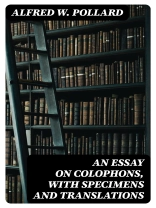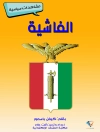In ‘An Essay on Colophons, with Specimens and Translations, ‘ Alfred W. Pollard presents a meticulous examination of colophons—those often-overlooked inscriptions found at the end of manuscripts. His analytical approach is rooted in an extensive survey of medieval and Renaissance texts, offering both literal translations and contextual interpretations that illuminate their significance. Pollard’s literary style is marked by clarity and precision, catering to both scholars and casual readers alike, while the scholarly context aligns with the burgeoning interest in manuscript studies and bibliographic research during the early 20th century. Alfred W. Pollard, a prominent bibliographer and a leading figure in manuscript studies, was deeply influenced by his own academic pursuits at Oxford and the burgeoning field of literary historical research in his era. His familiarity with the historical evolution of manuscripts and their textual nuances enables him to approach colophons with both depth and insight. Pollard’s authoritative voice in the field instills confidence in his interpretations and recommendations, which are essential for scholars of literature and history. Readers interested in textual criticism, manuscript history, or the nuanced interplay between authorship and publication practices will find great value in Pollard’s work. ‘An Essay on Colophons’ not only enriches our understanding of these inscrutable inscriptions but also invites readers to appreciate the multifaceted role that colophons play in the history of literature.
Sobre el autor
Alfred William Pollard (1859–1944) was a distinguished English bibliographer, a towering figure in early 20th-century scholarship on medieval books and English literature. With an illustrious career rooted in the rich soil of English philology and literature, Pollard made substantial contributions to the fields of Shakespearean studies, Chaucerian texts, and incunabula — the earliest printed books. His eminent work, ‘An Essay on Colophons, with Specimens and Translations’ reflects his keen interest in the production of books during the incunabula period and exemplifies his prowess in elucidating the provenance and historical contexts of early printed materials. Pollard’s scholarly finesse found expression in other notable works, including ‘Chaucer’s Canterbury Tales’, ‘Shakespeare Folios and Quartos’, and ‘Records of the English Bible’. His meticulous approach to literary research, coupled with his advocacy for bibliographic standards and textual integrity, helped pave the way for modern textual criticism. Pollard’s contributions to literary scholarship were recognized by his contemporaries, and his legacy endures through his insightful analysis and the bibliographic methods he championed. As an influential editor for the British Library and a professor at the University of London, his teachings and writings continue to inspire bibliographers and literary scholars around the globe.












